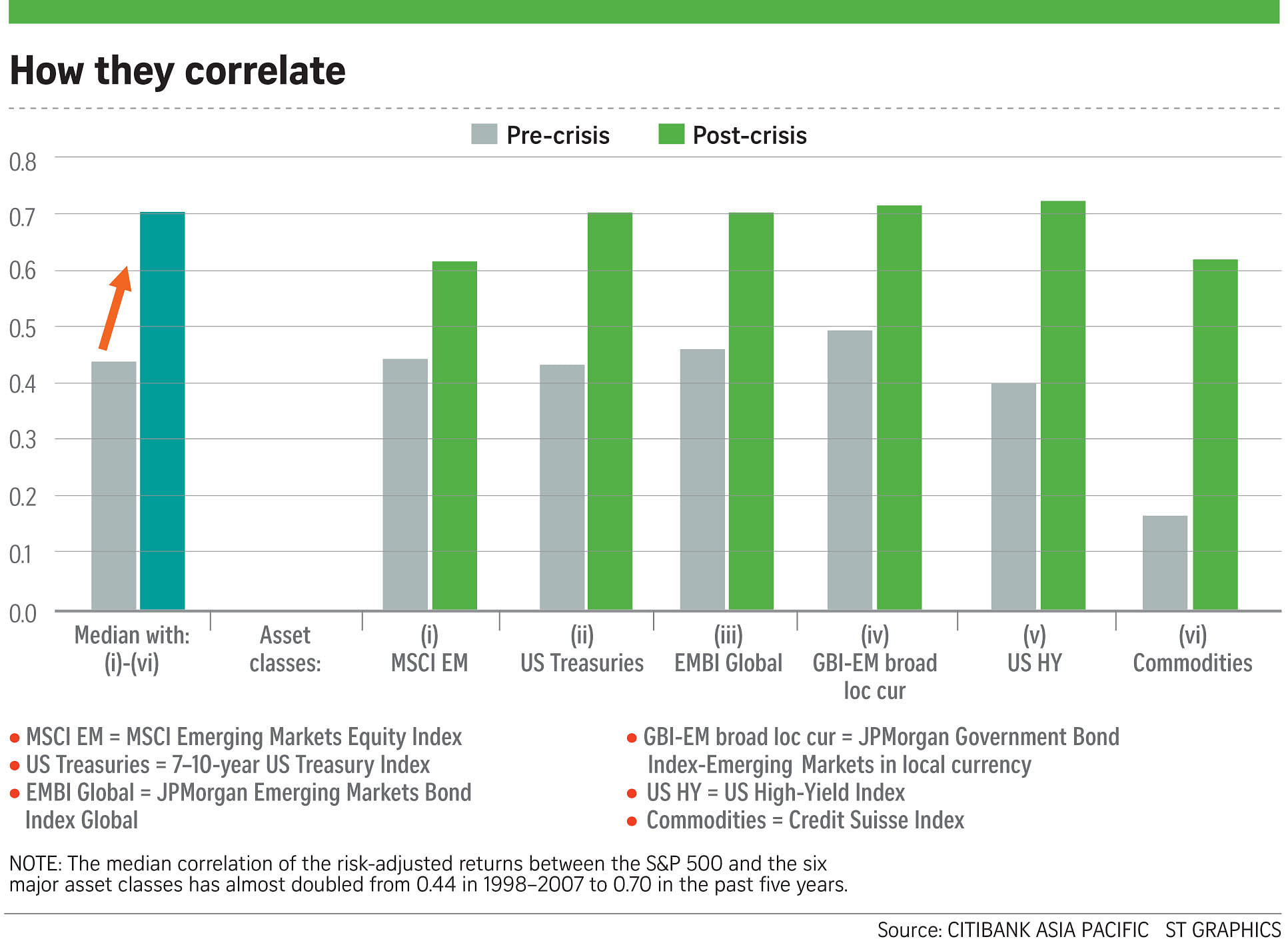Many say investing these days is difficult, as markets are very volatile. That observation seems true when we see the way markets have performed over the past few years.
Many investors look at fundamentals and valuations to make investment decisions, yet find that making money is relatively difficult.
Indeed, markets react in unexpected ways to events and, at times, it seems it is more important to understand market psychology rather than look for value.
Greed and fear often affect markets more these days than their true underlying fundamentals.
Since the global financial crisis, many investors have even come to doubt long-established rules that have governed the investment approach to portfolio investing.
Asset correlations have increased and there appears to be a "herd instinct" in movements within asset classes. For instance, the median correlation of the risk-adjusted returns between the S&P 500 and several major asset classes, like MSCI emerging markets equity index and JP Morgan emerging markets bond index global, has almost doubled from 0.44 in 1998-2007 to 0.70 in the past five years.
In the past, diversification was supposed to reduce risk and manage returns.
Since the financial crisis, this seems to have changed, as markets are trending more closely than before. This might be due to heightened risk aversion, which has seen changes in investor behaviour. Is this what we should expect going forward?
To answer this question, we need to look at the dynamics of the global economic environment and also the nature of the expectations of investors.
Since 2008, the global economy has been trying to recover from the impact of the financial crisis, which required massive fiscal and monetary support.
Most developed countries ran huge deficits, and major central banks not only cut interest rates to near zero but also embarked on various forms of quantitative easing.
With the exception of the United States, most central banks are expected to remain on an easing bias for some years.
This has created an abnormal environment where liquidity has driven asset prices higher while economic activity has remained relatively subdued.
Many now say this might be the new normal for the global economy, where growth is likely to remain sub-par, with low inflation coupled with higher unemployment and poor wage growth leading to wider wealth disparity. Sounds like a dreary outlook.
However, if we look back over the past few years, investors on average do not have much to complain about. Markets since the global financial crisis have done well, with many asset classes back to levels before the crisis or even higher.
Corporate earnings have grown strongly, balance sheets are robust and valuations are largely fair. Governments have also strengthened banking systems and are working to reduce systemic risk in the global economy.
The challenge now for governments is to attain sustainable growth while reducing fiscal deficits, and for central banks to normalise liquidity before creating new bubbles in asset classes.
If we were to look at risk and market volatility, these days it is not uncommon to see significant amounts of both. Because of the uneven nature of the global economic recovery and divergent monetary policies, we are entering a period where, due to "lack of liquidity", there is an increasing level of market movement.
Risk associated with currency and credit exposure plus political uncertainties has seen unprecedented periods of market volatility.
Stresses in the eurozone due to its debt crisis, China's own credit build-up on a slowing economy, plus a global economy struggling to avoid deflationary pressures, continue to affect investor confidence, resulting in concentration in so-called safe haven assets.
Investors will have to re-visit some of the rules of investing. The portfolio approach is going to be important, but there will be a need for a more dynamic proactive management, as market events will change faster than before.
Many investors have become wary of diversification and asset allocation, but now, with even more sources of uncertainty, the need to manage their risk will be even more important.
Hence, geographical and asset diversification will help improve the risk/return outlook over the next few years.
Investors should also lower their return expectations from what they have experienced over the past few years. We may need to reduce leverage in such an environment, as sharp movements in markets need to be managed.
Indeed, we expect volatility to increase, as information flow is instantaneous and reactions to events are swift.
Hence, having regular portfolio reviews and clear objectives will serve an investor better as we look to a global economy that slowly reverts, over time, to a more normalised state.
•Mr Haren Shah is chief investment strategist, Investment Strategy Group, Wealth Management at Citibank Asia Pacific


